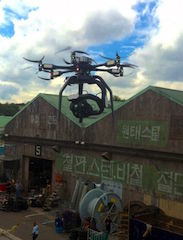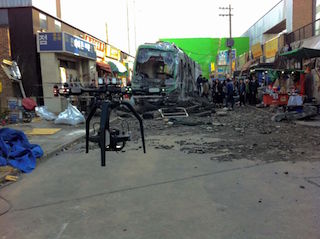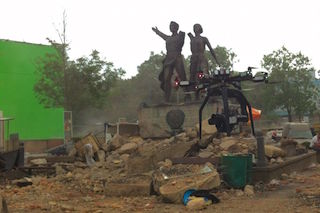 Helicopter Film Services used the Aerigon aerial remote camera head from Intuitive Aerial to shoot aerial footage used throughout Marvel’s Avengers: Age of Ultron. The footage was fed directly into ILM’s VFX pipeline.
Helicopter Film Services used the Aerigon aerial remote camera head from Intuitive Aerial to shoot aerial footage used throughout Marvel’s Avengers: Age of Ultron. The footage was fed directly into ILM’s VFX pipeline.
“The Aerigon drone was able to fly at lower altitude than the helicopter, giving us more dramatic sweeping camera moves than we'd have been able to get otherwise,” said Christopher Townsend, overall production VFX supervisor on Avengers: Age of Ultron. “It was quick and efficient to get it flying, with real-time visual feedback. The resulting footage was great, stable, and clean, which was an absolute necessity as we were using it as background plates, into which we added CG VFX elements.”
Helicopter Film Services (HFS) captured aerial footage on set in Hendon, U.K. for ten days during the production of the film. Its three-person crew flew the Aerigon carrying the Red Dragon.
“We had to get a stable shot the first time and the Aerigon let us do this,” said Jeremy Braben Aerial DP and founder of HFS. “Drones can leap about, but the Aerigon is the most stable drone we’ve seen without depending on post-stabilization. There isn’t the buzz or vibration with the Aerigon gimbal.”
The aerial crew shot background plates and live action, under instructions from Joss Whedon, director, John Mahaffie, the 2nd unit director, Ben Davis, the DP, and the VFX supervisors, including Townsend.
“We could be working to the directions of three different people, all on the same day,” said Braben. “That made time in the air a premium during production.”
HFS created aerial view plates of a town before and after its destruction. The camera was aimed to cover off the set in tiles, so the plates would cover more space than the camera’s field of view. The VFX team built up a 3D model of the town using these plates.
 “There were shots that we could only do with the Aerigon,” Braben said. “For one shot, we flew it from the top of a building, passed it through a portico, and brought it out the other side. You can’t really do that with a wire cam.”
“There were shots that we could only do with the Aerigon,” Braben said. “For one shot, we flew it from the top of a building, passed it through a portico, and brought it out the other side. You can’t really do that with a wire cam.”
Braben depends on a small team of experienced pilots. Pete Ayriss, who flew the Aerigon on the set of Marvel’s Avengers: Age of Ultron, is an RC championship pilot who has done a lot of 3D flying and has been piloting camera drones for five years. A camera technician assistant rounds out the crew. The Aerigon can carry more than 20 pounds of camera equipment, meaning that HFS can carry the camera equipment Braben favors, such as the latest Arri Alexa Mini.
“It’s when we add a zoom lens to the camera, that the Aerigon becomes the only cinema drone capable of doing the job,” explained Braben. “The weight shift of adding one of these lenses to the camera doesn’t affect the balance. With the Aerigon we can choose lenses that fit, are light, and that productions like.”
Braben relies on three lenses: the Angenieux Optimo 15-40 mm zoom, the Zeiss lightweight LWZ 14.5 to 45 mm, and the Zeiss Master Anamorphic Primes. Whatever lens and camera he chooses, the Aerigon gimbal and controller give him full focus, iris, zoom controls.
Braben was a ground DP for years before becoming an aerial cinematographer. He also had a love of aviation and got his private helicopter pilot’s license. Combining his two passions – flying and cinematography – led to the creation of Helicopter Film Services in 1993. He closely watched the development of drones, wondering whether they could fit into his business. It was seeing the shots that could be obtained from drones that made him want to include them in his business. But he knew he had to find the right system.
“Because we’re at the top end of film production, we work with high-end cameras and need a professional cinema drone that provides stable images,” Braben explained. “The Aerigon is that drone.”
With decades of experience using helicopters, wire cams, tracking vehicles, and, now, drones, Braben has thought a lot about how drones can best fit into production shoots. From this knowledge base, he is able to provide impartial advice about which equipment to use on a production.
“Because we can do any or all of these things, we can offer an unbiased opinion about what is the right piece of equipment for a particular shot,” he said. “On production, we assess whether a drone is a viable option.”
 While other systems have their benefits – for example, a helicopter can go longer distances, fly at higher altitudes, carry heavier camera payloads, and hover – a professional cinema drone is flexible and can be operated for a fraction of the cost of a helicopter. It also moves in three dimensions, overcoming the limitations of using a crane, dolly, or wire rig, which are fixed in one dimension. HFS has done commercial work for Jaguar, Range Rover, and Aston Martin, among others.
While other systems have their benefits – for example, a helicopter can go longer distances, fly at higher altitudes, carry heavier camera payloads, and hover – a professional cinema drone is flexible and can be operated for a fraction of the cost of a helicopter. It also moves in three dimensions, overcoming the limitations of using a crane, dolly, or wire rig, which are fixed in one dimension. HFS has done commercial work for Jaguar, Range Rover, and Aston Martin, among others.
“Drones are definitely having an effect on lower-budget productions that require an aerial shot,” Braben said. “You’re seeing this happening in television. There’s definitely an artistic advantage to getting some shots with drones that, until now, have been almost impossible to get.”
Then there’s the effect the Aerigon is having on feature film productions, with HFS using it extensively on Avengers: Age of Ultron,Into the Woods, and upcoming films such as Now You See Me: The Second Act, Mission: Impossible – Rogue Nation, Spectre, andThe Huntsman.
“Drones allow filmmakers to design really creative shots and achieve them,” Braben said. “I love having the ability to realize shots with the Aerigon that others perceive as impossible. With the Aerigon, we have more flexibility and a more diverse palette to work with. We get shots that everyone’s thrilled about.”
Intuitive Aerial www.intuitiveaerial.com
